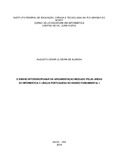O ensino interdisciplinar da argumentação mediado pelas áreas de informática e língua portuguesa no ensino fundamental I

Visualizar/
Data
2019-03-20Autor
Almeida, Augusto César Oliveira de
http://lattes.cnpq.br/2464204481094208
Metadado
Mostrar registro completoResumo
At schools, argumentation is usually a topic in Portuguese language classes, however, informatics also presents diverse abilities that may help to perfect those skills. Thus, what would result from the combined strengths of the two subjects in order to improve the students' argumentative skills? That question motivated scholars from the Institutional Program of Scholarship for the Incentive to Teaching (PIBID), subprogram Informatics in IFRN, after noticing among the 3rd grade elementary students at the State School Professor Antonio Fagundes (EEPAF) difficulties to express and contest ideas. This way, the matter of study was defined: the teaching of argumentation mediated by the two subjects – informatics and Portuguese language. From this, the methodology adopted for the study was the action-research. Also, bibliography about interdisciplinarity was revisited and topics were selected from the subjects involved that would be worked on to enhance the pupils' argumentative skills. The activities were developed during the whole school year of 2016, with weekly meetings of 2 hours-class, being that the focus, in the first semester, was on the topics of Portuguese language and, in the second one, it was on the contents about informatics. The assessment occurred in a qualitative way and continuously, using a conceptual system which led to classifying the study and the students' development as “highly satisfactory”, as observed from the exercises made during the classes. In the end, two workshops were given in order to apply the knowledge worked on during the year. The first one focused on informatics to develop an analogical game where arguing is performed in context with computational logic The second workshop, which otherwise focused on Portuguese language and on concepts learned from the subject computational logic, assessing the students’ perception of context, their ability to approximate the context observed to everyday situations and the coherence of their arguments. The results obtained reveal that, with the activities, the students improved their notions of context and of forming arguments. The study concludes that: the interdisciplinarity of informatics and Portuguese language enhanced the students' argumentative abilities; the cognitive process of children between 7 and 12 years old was favorable to the inclusion of topics that stimulate the logical reasoning in a more complex way than in previous school stages; the topics selected were successfully adapted to the students’ age and social reality; the unplugged computing contributed to the abstraction of the knowledge involved.



